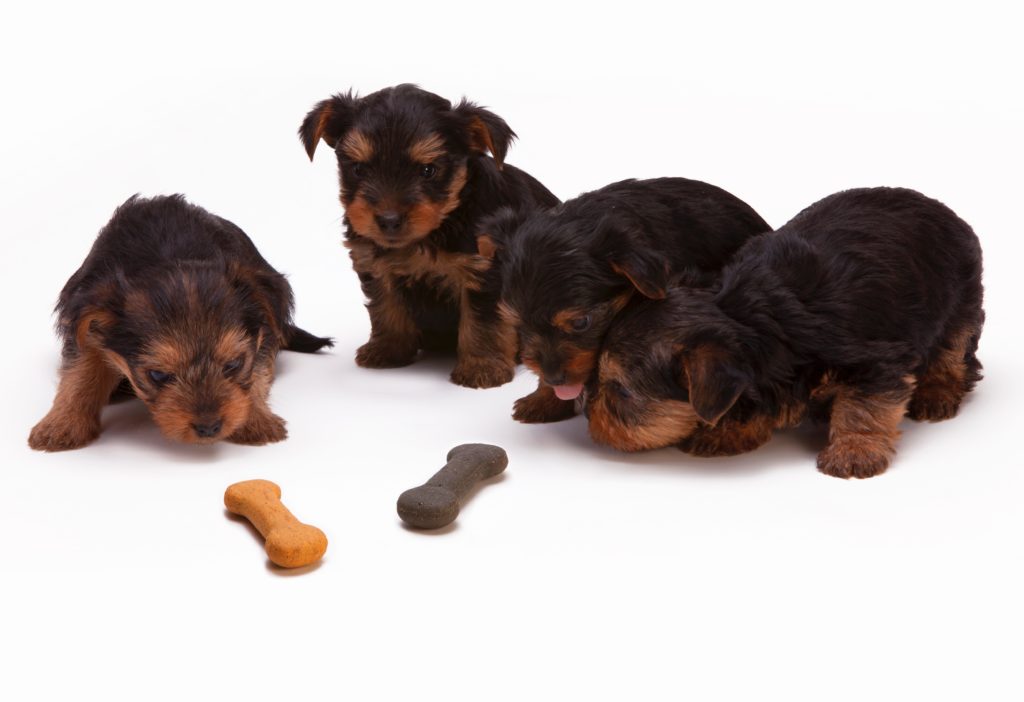Normally, a four-week-old puppy is still in the nursing phase, getting the vital nutrients the mother’s milk provides. However, some circumstances separate a young puppy and the mother, so as an owner it is critical to know proper ways of nurturing in this vulnerable stage of early life.
This article will give you a rundown on the best ways to tend to your four-week-old puppy to ensure his safe passage to young puppyhood.
Feeding A Four-Week-Old Puppy
Just like babies, puppies are completely individual and often require different schedules and food formulas to ensure optimal health and well-being. However, there are certain things that tend to work well for most four-week-old puppies.
As always, check with your veterinarian if you are concerned with your puppy’s health or sense that your puppy might need an alternative method of nursing.
What You Need
- Dog milk substitute*
- Dry puppy food*
- Baby bottle
- Bowl (for mixing milk and food)
*(The milk substitute and dry food can be found at most pet stores.)
Feeding Schedules

At four weeks old, most puppies begin transitioning from solely milk to a combination of milk and food. It is normally referred to as soft food, where water and/or a milk substitute is added to dry food to make a mushy, gruel-like meal.
Both milk substitutes alone and soft foods are best made fresh, so refrain from premixing the food when at all possible. Below is a recommended plan to feed your puppy four times per day: morning, midday, afternoon, and evening.
Morning
Be ready to wake up early! Four-week-old puppies are early risers, and when they wake up they will be hungry.
Mix together milk substitute in a bowl and offer it to your puppy. If your puppy has trouble drinking from a bowl because they are still used to his mother, you can use a small baby bottle to assist in feeding.
Alternatively, if your puppy is comfortable drinking milk from a bowl by the fourth week, you can try mixing in the soft food with the milk substitute or water. It should have the consistency of slightly runny oatmeal.
Be patient in the transition from milk to soft foods, as your puppy might seem confused or resistant at first to the change in diet. Little by little, though, he will become used to the consistency.
Midday
The second meal should be around noon. If you spend most of your day away from the house, you must either bring your puppy with you or find a caretaker to watch over and feed him. It is recommended to take your puppy for short walks and to hold him much like you would a newborn baby.
The first several weeks of a puppy’s life are critical in developing a healthy relationship with the owner. Being physically present and consistently nurturing will make a great difference in your puppy’s mental health and relationship with you. It will create a familiar environment and sense of safety that is necessary for healthy growth and maturation. You probably have met at least one dog that has been neglected by its human companion, and you can see the detrimental effects it has on his ability to socialize well with other dogs and humans.
Afternoon

The third meal should be around 3 pm. It is generally good to make a lighter meal at this time of day. By now, your puppy will be winding down a little bit and you do not want to overfeed them.
Evening
The last supper should be around 6 pm. This is usually an important meal because it will help keep your puppy’s hunger at bay throughout the night. Sometimes, though, puppies will wake up during the course of the night. You can make them a small mix of milk or soft food to ease their hunger and help them fall back to sleep. If you haven’t noticed yet, this is a full-time job!
Conclusion
This is a general guideline for feeding a four-week-old puppy. The most important advice is to pay attention to how your puppy is reacting to the milk and/or the food and to seek immediate help if you think there is something wrong with your puppy’s digestion or appetite. Getting the right nutrients at this stage of puppy life makes all the difference.




